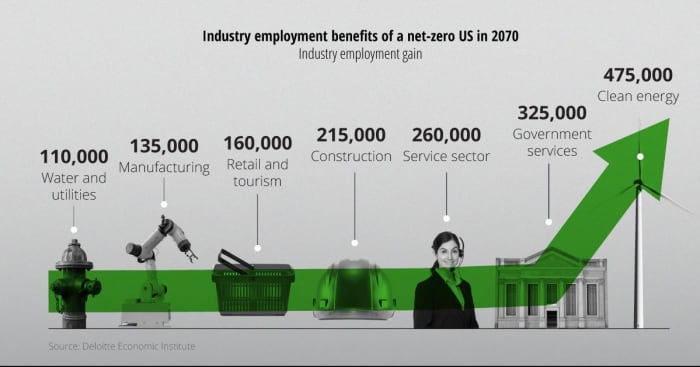This post was originally published on this site
Definitive and deliberate climate action from Wall Street to Washington and beyond could deliver a $3 trillion gain to the U.S. economy over the next 50 years to 2070. But it’s the toll of inaction that would cost the nation nearly five times that amount, a leading business consultancy says.
A new report this week from the Deloitte Economics Institute shows that the U.S. could expand by $3 trillion if it rapidly decarbonizes, meaning becomes less-reliant on fossil fuels
CL00,
and instead advances the technology for expansive renewable energy
TAN,
over the next 50 years.
There will be a stinging period of economic transition, creating “winners” and “losers”, then a breakeven point, and finally a newly competitive economy, the researchers argue. This once-in-a-generation transformation could add nearly 1 million more jobs to the U.S. economy by 2070, according to the report, “The Turning Point: A new economic climate in the United States.”
“The report makes the case for another industrial revolution in the U.S — one built on low-emissions growth — to avoid significant losses from the climate crisis and to create a more dynamic, prosperous economy for the U.S.,” said Alicia Rose, deputy CEO for Deloitte U.S. “The analysis shows that the battle to slow climate change is not only an aspirational goal, but an economic imperative for the U.S.”

Deloitte Economic Institute
The other side of the ledger is eye-opening.
Over the past 50 years, the U.S. has suffered a total of $1.4 trillion in economic losses due to weather, climate and water hazards, and while pathways for the climate and economies are never linear, climate science and Deloitte’s analysis argue that an increase in global average temperatures could cost the U.S economy $14.5 trillion (in present-value terms) over the next 50 years.
Don’t miss: The ‘dirty’ U.S. economy bounced back faster than overall growth last year — here’s how
If global warming reaches around 3°C toward the century’s end, Deloitte’s analysis indicates that economic damages would grow and compound, affecting every industry and region in the country. This would make it harder for people to live and work due to heat stress, rising sea levels, damaged infrastructure and reduced agricultural productivity.
A separate report this week, from insurance and business consultancy Aon, showed that deadly and costly Hurricane Ida and massive flooding in Europe fueled $329 billion in global economic losses linked to severe weather just last year, and only 38% of that tally was covered by insurance.
Deloitte’s analysis shows the 50-year loss of $14.5 trillion would slice 4% from gross domestic product (GDP), the broadest measure of the economy. That means about $1.5 trillion in 2070 alone. And over the next 50 years, nearly 900,000 jobs could disappear each year due to climate damage.
“‘If the U.S. chooses to adopt an ambitious, holistic path towards decarbonization it could see net economic gains by 2048.’”
Read: Every whale is worth $2 million? Why it’s time to add the value of nature to GDP
The report sets out a scenario with four key stages for the U.S. climate transition:
- Between now and 2025, the public and private sectors make bold decisions to rapidly transition to renewable energy. This involves transforming the electricity value chain, such as storage and transmission, that enables parallel and synchronized advances in the mobility, industrial and food systems.
- From 2026 to 2040, the acceleration to net-zero creates major economic shifts in policy, energy systems, investment priorities and consumer behavior.
- From 2041 to 2050 — which is the turning point where the benefits of transition outweigh the costs — decarbonization of high-emission industries is almost complete. The costs of sustainable technologies decrease, and wider net economic gains are realized.
- In 2050 and beyond, the U.S. economy is radically transformed and is more globally competitive in core industries. The economy achieves net-zero emissions, operating in a world that keeps global warming to below 2°C.
“If the U.S. chooses to adopt an ambitious, holistic path towards decarbonization it could see net economic gains by 2048,” Scott Corwin, managing director in Deloitte U.S.’s ESG Strategic Growth Offering, summed up. “Every region of the country would benefit economically.”

